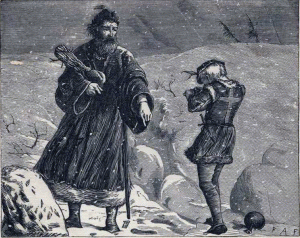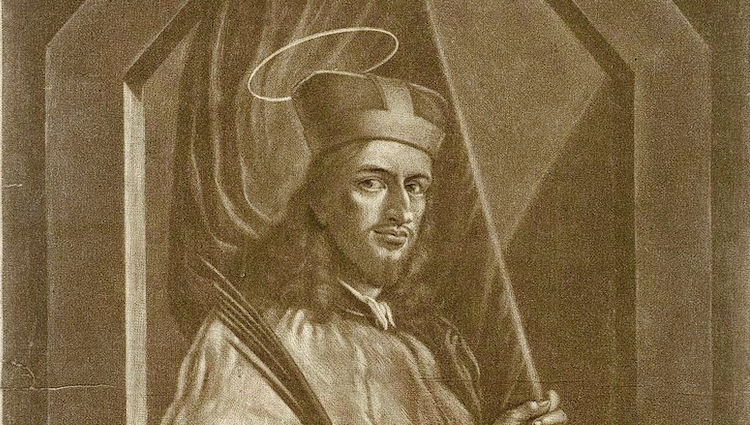 “Good King Wenceslas” is a Christmas carol that tells a story of a Bohemian king going on a journey and braving harsh winter weather to give alms to a poor peasant on the Feast of Stephen (December 26, the Second Day of Christmas). During the journey, his page is about to give up the struggle against the cold weather, but is enabled to continue by following the king’s footprints, step for step, through the deep snow. The legend is based on the life of the historical Saint Wenceslaus I, Duke of Bohemia or Svatý Václav in Czech (907–935). The name Wenceslas is a Latinised version of the old Czech language “Venceslav.”
“Good King Wenceslas” is a Christmas carol that tells a story of a Bohemian king going on a journey and braving harsh winter weather to give alms to a poor peasant on the Feast of Stephen (December 26, the Second Day of Christmas). During the journey, his page is about to give up the struggle against the cold weather, but is enabled to continue by following the king’s footprints, step for step, through the deep snow. The legend is based on the life of the historical Saint Wenceslaus I, Duke of Bohemia or Svatý Václav in Czech (907–935). The name Wenceslas is a Latinised version of the old Czech language “Venceslav.”
In 1853, English hymnwriter John Mason Neale wrote the “Wenceslas” lyric, in collaboration with his music editor Thomas Helmore, and the carol first appeared in Carols for Christmas-Tide, published by Novello & Co the same year. Neale’s lyric was set to the melody of 13th-century spring carol “Tempus adest floridum” (“The time is near for flowering”) first published in the 1582 Finnish song collection Piae Cantiones.
Wenceslas was considered a martyr and a saint immediately after his death in the 10th century, when a cult of Wenceslas rose up in Bohemia and in England.[3] Within a few decades of Wenceslas’ death, four biographies of him were in circulation. These hagiographies had a powerful influence on the High Middle Ages conceptualization of the rex iustus, or “righteous king”—that is, a monarch whose power stems mainly from his great piety, as well as from his princely vigor.
—Read the rest of the entry at Wikipedia. (Text is available under the Creative Commons Attribution-ShareAlike License.)
Lyrics:
Good King Wenceslas looked out,
on the Feast of Stephen,
When the snow lay round about,
deep and crisp and even;
Brightly shone the moon that night,
tho’ the frost was cruel,
When a poor man came in sight,
gath’ring winter fuel.
“Hither, page, and stand by me,
if thou know’st it, telling,
Yonder peasant, who is he?
Where and what his dwelling?”
“Sire, he lives a good league hence,
underneath the mountain;
Right against the forest fence,
by Saint Agnes’ fountain.”
“Bring me flesh, and bring me wine,
bring me pine logs hither:
Thou and I shall see him dine,
when we bear them thither.”
Page and monarch, forth they went,
forth they went together;
Through the rude wind’s wild lament
and the bitter weather.
“Sire, the night is darker now,
and the wind blows stronger;
Fails my heart, I know not how;
I can go no longer.”
“Mark my footsteps, good my page.
Tread thou in them boldly
Thou shalt find the winter’s rage
freeze thy blood less coldly.”
In his master’s steps he trod,
where the snow lay dinted;
Heat was in the very sod
which the saint had printed.
Therefore, Christian men, be sure,
wealth or rank possessing,
Ye who now will bless the poor,
shall yourselves find blessing.
This essay was first published here in December 2020.
The Imaginative Conservative applies the principle of appreciation to the discussion of culture and politics—we approach dialogue with magnanimity rather than with mere civility. Will you help us remain a refreshing oasis in the increasingly contentious arena of modern discourse? Please consider donating now.
The featured image was made by Johann Friedrich Leonard in 1670. This file is made available under the Creative Commons CC0 1.0 Universal Public Domain Dedication and appears here courtesy of Wikimedia Commons. The top image is “Good King Wenceslas from an 1879 book by Henry Ramsden Bramley” and is in the public domain, courtesy of Wikimedia Commons.


